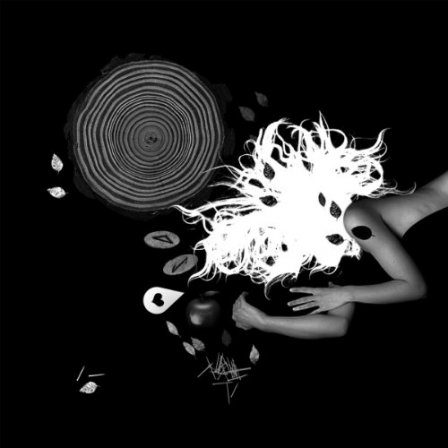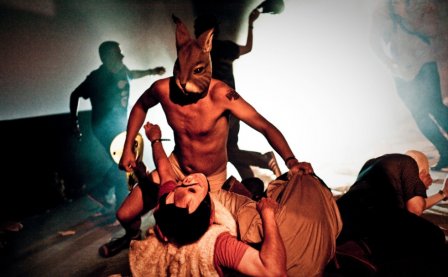In a way, 2010 was the year of the triptych. Robyn, the electro-pop Swede, staged a European comeback and American invasion over just six months with her three-part Body Talk series. Joanna Newsom got herself to Carnegie Hall on the strength of Have One on Me, an improbably bountiful three-disc trove of harp folk. And of course, there’s James Blake, whose three incredible (and incredibly distinct) EPs of yesteryear made his name and served as the perfect prelude to a strong contender for one of 2011’s best albums.
With Tryptych, the UK duo of Demdike Stare (Sean Canty and Mike Whittaker) have released the best work of their career, too. The main difference is that its three spectral discs were all originally presented as individual albums last year: Forest of Evil, Liberation Through Hearing, and Voices of Dust. However, Tryptych is not merely a premature canonization of those records; it includes over 40 minutes of previously unissued material from these 2010 sessions (most of it as good or better than what’s on their respective discs), accounting for a sizable chunk of its generous two and two-thirds hours of music. Seeing how these three records were all previously only available on vinyl also gives the impression that they were less standalone pieces than a gradual assembly of one sprawling yet singular work.
And good work it is. 2009’s Symbiosis was the sound of a group testing its earliest hypotheses, which wore thin fast as it failed to present enough compelling variations on the group’s formula blend of dark ambient and dub production. (I hear no reason to append a -step anywhere in this sentence, though if Blake and Burial can fit under the dubstep umbrella with partymongers like Rusko, then perhaps it’s broad and meaningless enough to include Demdike, too.) But Tryptych presents a broad, focused spectrum of frightful sounds and possessed moods, clear though subtle in its assimilation of and reference to various traditions.
Broad and various enough to satisfy an ethnomusicologist (or scholar of the occult), in fact. “Past is Past” makes simple, effective use of sitarly resonance. “Nothing But the Night 2” head-bobs uneasily between the tension of Middle Eastern scales and a subtle but insistent beat. “Bardo Thodol” does the same, but expands its palette (and spook quotient) by adding a vocal sample that — reprising a familiar technique from dub’s Jamaican 70s heyday — echoes and distorts until it begins to sound like a chant of cryptic ritual. Likewise, the drippy drums and drone of the dub Scientist meet the choral horrors of a Popol Vuh soundtrack on “Caged in Stammheim” or I Care-era Aphex Twin amidst “Repository of Light’s” warm respite.
In an abstract but palpable way, there are even traces of experimental jazz’s middle-period firmaments in the mix here. With tracks like “Past is Past” and the percussively textural “Desert Ascetic,” or certain segments of the “Forest of Evil” suite, Tryptych distantly echoes the distended magic of some of the more spacious and free-flowing Sun Ra compositions, Alice Coltrane journeys, and outtakes from Miles Davis’ Bitches Brew. “Regolith” inspires skin-crawling disgust by digitally evoking the sounds of insects swarming in a festering shit-pool, as Steve Lacy once did through more acoustic methods on his 1977 piece “The Rise.”
Then there’s the vaguely foreboding side of ambient. “Of Decay & Shadows” recalls the harsher frequencies of William Basinski’s Shortwavemusic and Alva Noto’s For 2, while “Black Sun” rumbles like one of Frank Bretschneider’s starker explorations of deep bass. “Matilda’s Dream” is a dilated passage most evocative of some unnerving 64-bit showdown with an impossible evil. “Library of Solomon Book 1” repeats the ingredients of “Matilda’s Dream,” but adds the rhythms of descending elevators and heartbeats — among other cryptic interjections — to create an entirely separate and equally engaging soundscape. (The gradual beat coalescence of its own sequel, “Book 2,” is even worthier, appropriating similar elements to make one of the strongest tracks of the set.) And then there’s the ominous “A Tale of Sand,” which might well be my unlikely favorite, for its mastery of the deep-set complexity and quiet majesty so rarely achieved in music of this ilk (or any).
One could argue that any triple LP might be strengthened by some editorial trimming, but considering that Tryptych embeds itself between the margins of that and a boxset, the mediocrity of a couple tracks (“Quiet Sky,” for instance) is easy to overlook. Issuing such a thorough CD document of a vinyl trilogy winds up not so much a simple change in format or an exercise in excess, but rather a telescopic glimpse into the rapidly expanding Demdike Stare universe. It’s a dark and miserable place, but one that will surely attract quite a few souls.
More about: Demdike Stare




